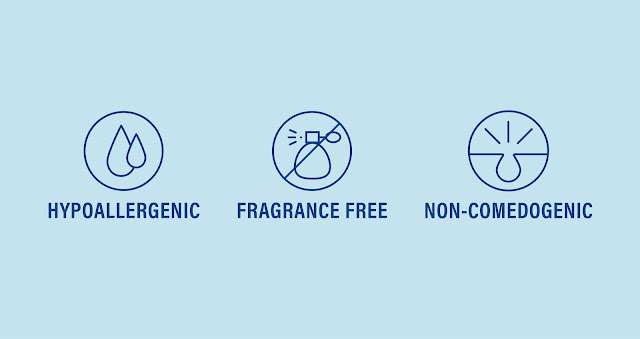These terms such as "Hypoallergenic, Non-comedogenic, Non-acnegenic" really don't hold really hold that much in weight when it comes to skincare. Granted there are few companies that do perform rigorous testing when it comes to these. However, these terms are still baseless in the sense since they are not regulated terms necessarily of the approval either by the FDA, and certain brands can just make these claims on their own. Many use these, which in fact its not a 100% certainty. Which mostly means it's "less-likely" to cause a reaction. Everyone's skin is as a unique as a thumbprint or one's DNA, so more so does NOT apply to everyone not experiencing a reaction of some sort & kind. They are not as scientifically proven as one me suspect when listed on a product's box or label. No product is ever set in stone to not cause a reaction.
Hypoallergenic/Allergy-Tested: Refers to least-likely cause of an allergic reaction & not containing known allergens. However, any ingredient or few of can cause a reaction to anyone's skin. Might be helpful to many, however not a term that should be consistently relied on.
Non-comedogenic/Non-acnegenic: Refers to least likely to cause clogged pores & acne. As mentioned previously not a term to be solely relied on and acne & clogged pores have a myriad of contributing factors. As with any product can cause a reaction as well. Granted there are ingredients that can be more comedogenic than others, that part is certain & true. Typically, lighter weight textures as well will predominantly be less comedogenic as far as formulas go.
Fragrance-Free: Many brands do offer fragrance-free products for ones whom can't tolerate them or are allergic to fragrance in general. However, "Unscented" products means that they use masking agents to neutralize otherwise unpleasant odors from a formula. Since certain formulated products may not always smell the greatest either. Certain natural ingredients carry natural aromas but don't pose a risk as far as irritation goes.
Skincare is trial & error though, and seeing which products suit you best based upon preferences such as skin concerns, textures, feel on the skin, etc. There's no one product that's an all-in-one done. Having a consistent routine and not having to be too lengthy either and just seeing what works best for you over and of course a routine that'll you'll stick to and as mentioned in the sentence before, consistency is key for optimal results and with products that agree with your skin obviously as well. Daily usage of your cleansers/toners, serums & moisturizers, sunscreens. 2x (no more than 3x) for facial masks & exfoliators & seeing the frequency that works best for you. Individuals with Sensitive skin can & may only need to exfoliate just once a week & relying on your skin's tolerance level as well.
Yours truly always,
Mr. Skin Care Guru

Comments
Post a Comment